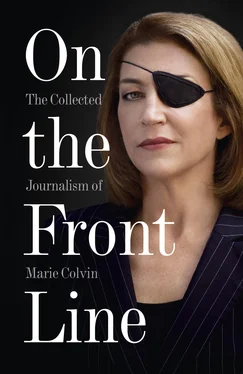1 ...6 7 8 10 11 12 ...25 Rabin, when he shook Arafat’s hand in Washington, seemed to be acknowledging that no matter how much he despised Arafat, the PLO leader was the only possible partner for peace. Since then, the Israeli prime minister has conducted peace negotiations not as if he was dealing with a partner but with an enemy that must be controlled and contained to the most minute detail. The last Israeli negotiating document stipulated that there should be opaque glass between the partitions at crossing points.
In making such details the focus of negotiations, and in seeking to divide and conquer, Israel has lost sight of what it agreed to do in Washington – make peace with the PLO, led by Arafat, for better or for worse. Rabin should begin dealing again with Arafat as a partner in peace. And the judgement of Arafat should be left to when it really matters, when he enters his homeland and heads the government.
Rabin last week told his cabinet: ‘We will let them sweat.’ Who? The PLO?
‘Look at me,’ said Arafat on Friday night. ‘I’m not sweating.’

Frightened Libyans await the next blow: sanctions
TRIPOLI
19 April 1992
The omens had been bad all week. Colonel Muammar Gadaffi lay tucked up in bed with tonsillitis, UN sanctions had closed off the country and Russian military advisers haggled for suitcases in the souk before making a break for the border. When the chill Hamsin wind blew in off the desert it seemed that even the weather was conspiring against the Libyan leader.
Out on the streets, Libyans felt anxious, vulnerable and isolated. While the sanctions imposed last week caused inconvenience not hardship, they were a severe psychological blow. Once again the Libyan people felt trapped in confrontation with the West. They are dreading the next turn of the screw. Oil sanctions? Another air strike?
The disgruntled middle-class expresses resentment only in private. At a dinner party in Tripoli last week guests lamented how Libya’s wealth had been frittered away, siphoned off to military and revolutionary movements all over the world.
‘We are only 4m Libyans and we export 1m barrels of oil a day,’ a businessman said. ‘We could be like Saudi Arabia. Instead look at us.’
His expansive wave of disgust took in the shabby clothes of his countrymen, the dirty hospitals where patients often sleep two to a bed and the vast, grimy supermarkets like the Souk al Jumaa that stand empty or display rows of plastic candelabra from Romania.
Such anger is, of course, impotent because Gadaffi brooks no opposition. After rumblings of discontent, he has reinstated his ‘revolutionary committees’, the young shock troops that were stood down three years ago after an outcry over their ‘excesses’.
The escalating tension evoked memories of the weeks leading up to the American bombing of Tripoli and Benghazi in 1986, during which at least 70 civilians, including Gadaffi’s adopted daughter, were killed. On television, announcers condemn George Bush as ‘unjust’ and read telegrams of support. ‘The crusaders think they can humiliate these people, the Libyan people, but they are mistaken,’ raged one Muslim preacher in a televised sermon. ‘We will bend our heads only to Allah.’
The appeals may be the same but there is a key difference. Gone is the fury of the organised daily demonstrations; one protest in Tripoli’s Green Square drew only about 50 young men who danced to Algerian rai music before drifting away in good humour.
Gadaffi was chastened by the bombing and has so far forsworn the revolutionary rhetoric of 1986. As he lay on his sickbed, he was no doubt pondering the dilemma of whether to surrender the two Libyan intelligence agents accused of planting the bomb that exploded aboard a Pan Am jet over Lockerbie three years ago, killing 270 people.
Although his old friend Yasser Arafat, the PLO leader, returned to Tripoli saying ‘I must stand by Libya and my brother Gadaffi’, solidarity is in short supply. The Soviet Union, Gadaffi’s long-time backer, is no more and Arab leaders refused landing permission to the planes he sent out in defiance of the UN sanctions.
It is no easy choice. Should Gadaffi surrender the accused men unconditionally, they may implicate more senior Libyan officials and prompt further demands. ‘If you hand them over, you are lost,’ one Arab envoy advised him last week. ‘The Americans will come back with a list of 100 names, then the name of Abdelsalam Jalloud [Gadaffi’s second-in-command], then your name.’
Jalloud, a rough-spoken major and Gadaffi’s close comrade since they seized power with a gang of young officers in 1969, is said to be arguing fiercely against surrendering the two suspects, both members of his tribe.
For many Libyans, fed up with 22 years of revolution and crisis, the new openness of Gadaffi’s own brand of perestroika now appears under threat. Should Gadaffi play a wrong move in his poker game his people are unlikely to forgive him, even though few think the West’s demands are just.
His low-key response suggests that he has been seeking a compromise behind the scenes to have sanctions against air travel, diplomats and arms lifted. He does not wish to repeat the mistake of Saddam Hussein, and knows that taking foreign workers as a ‘human shield’ would only unleash a violent reaction.
But Libyans are disillusioned. Today only the revolutionary committee apparatchiks believe the new sign on the road to the airport: ‘We are all Muammar Gadaffis.’

Adie’s minder cracks up: Saleh
TRIPOLI
26 April 1992
Saleh is a broken man, his health uncertain, his job insecure. But his plight has little to do with the political pressures on the beleaguered Libyan regime that employs him. Recovering from a nervous breakdown, Saleh sums up his woes in two words: Kate Adie.
Assigned as a government ‘minder’ to the roving doyenne of the BBC, Saleh looks back on it all from his sickbed with the horror of a man plucked from the deck of a sinking ship in shark-infested waters. ‘Oh dear,’ he moaned. ‘Kate Adie has been very bad for my health. I have very tender nerves.’
Adie, a veteran of Tiananmen Square, Tripoli and the Gulf, succeeded where sanctions had failed: she had brought the government to its knees.
The extent of the Libyan anguish emerged last week in an extraordinary telex to the BBC, in which Tripoli bemoaned the pugnacious temperament of Adie and pleaded for her to be withdrawn.
‘All our attempts to obtain a common and satisfactory solution were gone with the wind,’ lamented the telex. ‘We are demanding never ever send Kate Adie to Libya whatever the reasons are.’
By that stage, Saleh was at his wits end. Wandering into the lobby of the Bab al-Bahar hotel, he fainted. Coming round, he muttered, ‘If you ask me to choose Kate Adie or prison I would not hesitate to choose the prison.’
Grimacing as he relived their last encounter, in a crowded hotel lobby, Saleh said: ‘She said she should be filming demonstrations. I told her there were no demonstrations or clashes. But she insisted we find some.’
Deploying ruthless hyperbole, Adie said Libya was treating the foreign press ‘in a manner that had gone out of fashion with Stalin’.
Saleh respectfully suggested Adie should leave. But that was like waving a red flag at a bull. ‘If you are throwing me out it will be very bad for your country,’ she stormed.
Читать дальше













